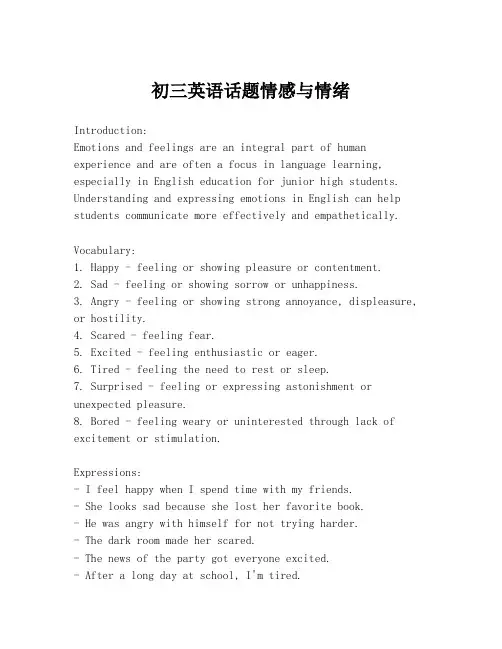初三英语话题公开课(情感).ppt.
- 格式:ppt
- 大小:1.95 MB
- 文档页数:26








初三英语话题情感与情绪Introduction:Emotions and feelings are an integral part of human experience and are often a focus in language learning, especially in English education for junior high students. Understanding and expressing emotions in English can help students communicate more effectively and empathetically.Vocabulary:1. Happy - feeling or showing pleasure or contentment.2. Sad - feeling or showing sorrow or unhappiness.3. Angry - feeling or showing strong annoyance, displeasure, or hostility.4. Scared - feeling fear.5. Excited - feeling enthusiastic or eager.6. Tired - feeling the need to rest or sleep.7. Surprised - feeling or expressing astonishment or unexpected pleasure.8. Bored - feeling weary or uninterested through lack of excitement or stimulation.Expressions:- I feel happy when I spend time with my friends.- She looks sad because she lost her favorite book.- He was angry with himself for not trying harder.- The dark room made her scared.- The news of the party got everyone excited.- After a long day at school, I'm tired.- To my surprise, he won the first prize.- The repetitive lecture made the students bored.Conversation Practice:A: How are you feeling today?B: I'm feeling a bit down, I think I'm sad.A: That's okay. It's normal to feel sad sometimes. What makes you feel this way?B: I didn't do well on my math test.A: I understand. But remember, it's just a test and you can improve next time. Let's find a way to study together and make it more exciting for you.Reading Passage:Once upon a time, in a small village, there was a young boy named Tim who loved to explore. One day, he discovered a hidden path in the forest and felt excited about his find. As he ventured deeper, he came across a small, scared rabbit caught in a trap. Tim felt sad for the rabbit and carefully freed it. The rabbit hopped away, and Tim felt happy that he could help. Later, as the sun began to set, Tim felt tired and decided to head home. That night, he went to bed with a heart full of emotions, excited for more adventures to come.Conclusion:Teaching and understanding emotions and feelings in English helps students to not only improve their language skills but also to develop emotional intelligence. It allows them to express themselves more accurately and to better understand the feelings of others, fostering empathy and compassion.。